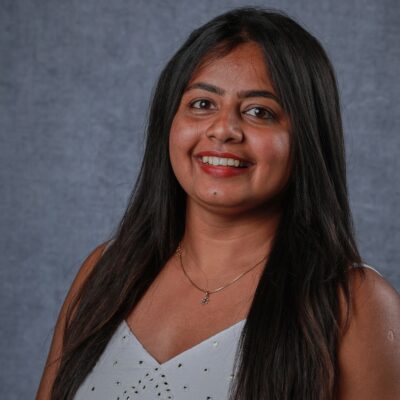Student Spotlight: Aleesha George

October 13, 2025
Aleesha George is a doctoral candidate in chemistry and chemical biology from Kerala, India. She earned a bachelor’s degree in chemistry from Kerala University and a master’s degree in analytical chemistry from Mahatma Gandhi University in India and now studies the optical and electronic properties of organic and hybrid materials under the guidance of Andrew Musser at Cornell.
What is your area of research and why is it important?
I study the optical and electronic properties of organic and hybrid materials. More specifically, I investigate how molecules, polymers, or nanoclusters interact with light when placed inside an optical cavity (basically just sandwich them between two highly reflective mirrors). This enables the formation of new quasiparticles called polaritons which ultimately have mixed properties of both light and matter – something I like to describe as “light and matter getting married.” This research is important because it can lay the foundation for advanced technologies like quantum computing, low-power lasers, and advanced communication systems – all while utilizing more sustainable organic materials as compared to their inorganic counterparts.
What are the larger implications of this research?
The ability to harness light efficiently has the potential to transform global technology. My work could lead to faster, greener methods for data processing and communication, addressing urgent energy challenges as our digital world expands. These advances could reduce power consumption in industries ranging from telecommunications to computing, while also opening doors for breakthroughs in health care imaging and sensing. By pushing the boundaries of optical semiconductor technology, this research contributes to building more sustainable systems that align with society’s increasing demand for energy efficiency and technological innovation.
What does it mean to you to have been awarded the AAUW International Doctoral Fellowship and what will it allow you to do that you may not have been able to otherwise?
Being awarded the AAUW International Fellowship is an incredible honor – as an international student, funding opportunities are limited, and this fellowship recognizes both my research and my mission to support girls in STEM. It allows me to complete my Ph.D. with financial security especially in these times of uncertainty, focus on impactful research, and expand outreach efforts like my nonprofit to empower more young women in science
Can you tell us about your nonprofit, Adopt-A-Future?
I founded Adopt-A-Future, a grassroots initiative dedicated to supporting the education of girls from underrepresented and disadvantaged communities in India. The program operates along two pathways: first, by raising funds to provide scholarships and access to quality education, and second, by organizing science and English workshops that build skills, confidence, and pathways to higher education. The mission is to bridge opportunity gaps and show young girls that they can dream beyond their circumstances. Adopt-A-Future reflects my passion for combining science with social impact and ensuring that the next generation of women have more opportunities than I did.
What are your hobbies or interests outside of your research or scholarship?
I love traveling – whether it’s discovering new countries, new cultures, new food, or simply wandering and exploring. My secret goal is to fill my passport with visa stamps before I graduate (haha!). Beyond adventures abroad, I spend much of my time on outreach, from doing science activities at the Greater Ithaca Activities Center and the Ithaca Sciencenter to outreach through programs like Expanding Your Horizons. As chair of the Diversity and International Students Committee of the Graduate and Professional Student Assembly, I also organize events that bring our graduate community together – work that keeps me busy and genuinely happy.
Why did you choose Cornell to pursue your degree?
When I received my offer from Cornell, it felt almost unreal. Coming from modest institutions in Kerala, I never imagined joining such a world-renowned university. Even during the virtual visitation weekend, I immediately sensed the warmth of the community, where people were genuinely supportive and caring. What sets the field of chemistry apart is its deeply collaborative nature, a rare and valuable strength. This environment has already opened doors for me, including the privilege of traveling to Paris this summer for research collaboration. Cornell’s strong culture of outreach and public engagement deeply resonated with my own passion for mentoring and education, making it the perfect place to grow both scientifically and personally.
